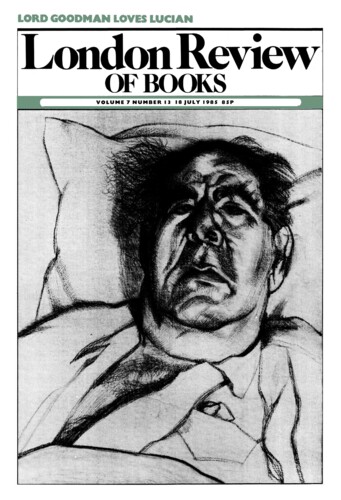Shakespeares
David Norbrook, 18 July 1985
‘Shakespeare one gets acquainted with without knowing how. It is part of an Englishman’s constitution.’ Henry Crawford’s comment in Mansfield Park is a reminder that ‘Shakespeare’ is more than an individual writer: ‘it’ is an institution, a body of texts whose study, from O-level to the highest reaches of academia, is a means of legitimating social advancement and whose production on the stage and on television makes a powerful contribution to Britain’s invisible exports. This ‘Shakespeare’ has the characteristics Roland Barthes ascribes to myth: it turns history into nature, and thus impedes critical political analysis. Not only the Englishman’s constitution but also the English constitution are traditionally felt to be particularly ‘natural’: Shakespeare’s plays are seen as embodying a characteristically English balance of opposites, neither too radical nor too conservative, neither too popular nor too élitist. Shakespeare, like the Queen, is held to be above politics; his regal status has been confirmed by the formation of the Royal Shakespeare Company – a title of which it has been said that ‘it’s got everything in it except God.’ And indeed the many resemblances between Shakespeare and God have become commonplaces since the Romantic era. In practice, of course, the idea of his transcendence tends to reinforce conservative political positions. If we are to believe Mr Nigel Lawson, Ulysses’ speech on Degree in Troilus and Cressida exercises a powerful influence on Conservative economic policy. One of the most influential of modern Shakespeare critics, G. Wilson Knight, gave his blessing to Britain’s campaign against Argentina on the grounds that it embodied the essential spirit of Shakespeare’s plays. The myth of Shakespeare is also a powerful force for intellectual conservatism: its notion of essential Englishness implies a distaste for abstract thought, for explicit political debate, for anything that savours of foreign, Jacobin rationalism. Criticism of Shakespeare has been slow to take account of recent developments in literary theory. Markers of A-level and university scripts can testify that the influence of E.M.W. Tillyard is still pronounced, with candidates clearly being brought to believe that having an original thought about Shakespeare would amount to presumptuous rebellion against the Great Chain of Being.’

